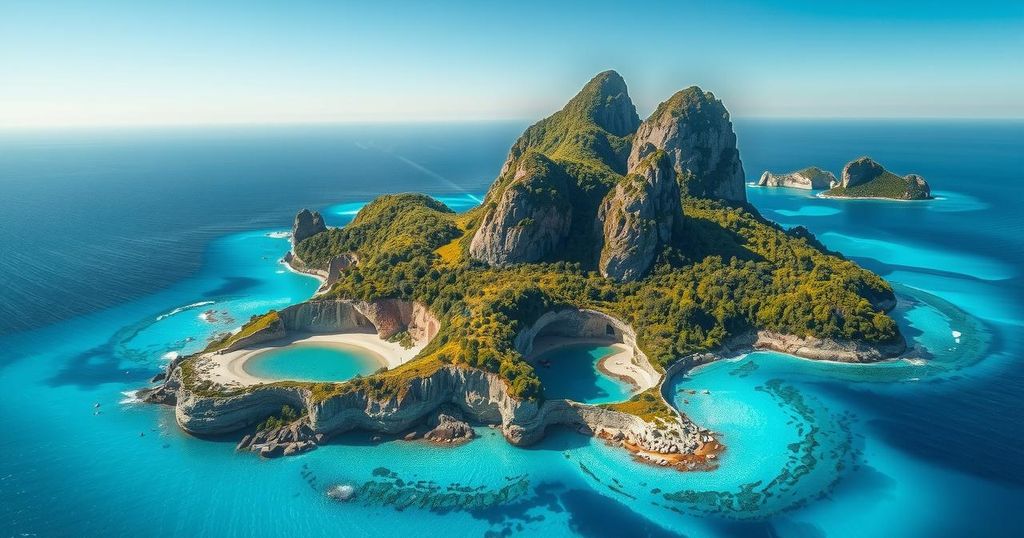Mayotte is an overseas department of France situated in the Comoros archipelago, characterized by poverty and dependency on French aid. The island features a volcanic landscape, a humid tropical climate, and a population primarily of Malagasy origin. Governed by French authorities, it has transitioned to a department status while facing ongoing challenges, including a recent catastrophic cyclone.
Mayotte, an overseas département of France, encompasses the two southeasternmost islands of the Comoros archipelago. Recognized as the poorest territory within both France and the European Union, Mayotte is located in the Mozambique Channel, approximately 190 miles northwest of Madagascar. The capital is Mamoudzou, situated on Grande Terre, the larger of the two islands, with the smaller island of Pamandzi connected by a causeway.
The geography of Mayotte features a volcanic mountain range that runs north to south, with elevations between 1,600 and 2,000 feet. The warm and humid climate results in average monthly temperatures ranging from 75 °F in August to 81 °F in December, and annual rainfall measures around 200 inches. The lush environment is characterized by evergreen tropical forests.
The current leadership includes François-Xavier Bieuville as the Prefect of France and Ben Issa Ousseni as the President of the Departmental Council. The estimated population in 2025 is 338,100, with Emmanuel Macron serving as the President of France.
The inhabitants, primarily of Malagasy origin, are predominantly Sunni Muslims influenced by French culture, with a minority of Roman Catholics. French is the official language; however, many residents speak Comorian, linked to Swahili. Most of the population resides in rural areas, while significant urban centers include Mamoudzou, Koungou, and Dzaoudzi.
Economically, Mayotte relies heavily on the service sector, which includes health care, telecommunications, and agriculture, with crops such as vanilla and ylang-ylang cultivated for export. The territory significantly depends on French aid for sustenance, and its major trading partner is metropolitan France.
Mayotte’s political structure evolved from a special status as a territorial collectivity in 1976 to its designation as an overseas department in March 2011. This status has been disputed by Comoros since its declaration of independence in 1975. Representation in the French National Assembly and Senate includes a deputy and two senators, and governance is administered through a French-appointed prefect and an elected council.
Historically, Mayotte’s population converted to Islam during the 15th century due to Arab invasions, and it came under French colonial control in 1843. Following political changes in the 20th century, Mayotte opted to remain French when other islands opted for independence in 1975. A 2009 referendum showed overwhelming support for the region’s transition to an overseas department, which was realized in 2011.
Despite being under French governance, severe poverty persists in Mayotte, leading to significant migration from Comoros. In December 2024, a devastating category-4 cyclone named Chido struck, causing extensive destruction across the islands and leaving numerous residents without shelter or access to basic necessities, with a massive death toll anticipated.
In summary, Mayotte is a unique territory with a rich history and diverse cultural influences, characterized by significant economic challenges and dependency on French support. The shift to an overseas department has had implications for its political status, while the recent devastation from Cyclone Chido underscores the region’s vulnerability to natural disasters. Its young population, coupled with a heavy reliance on the service sector, continues to face challenges associated with poverty and infrastructure development.
Original Source: www.britannica.com






